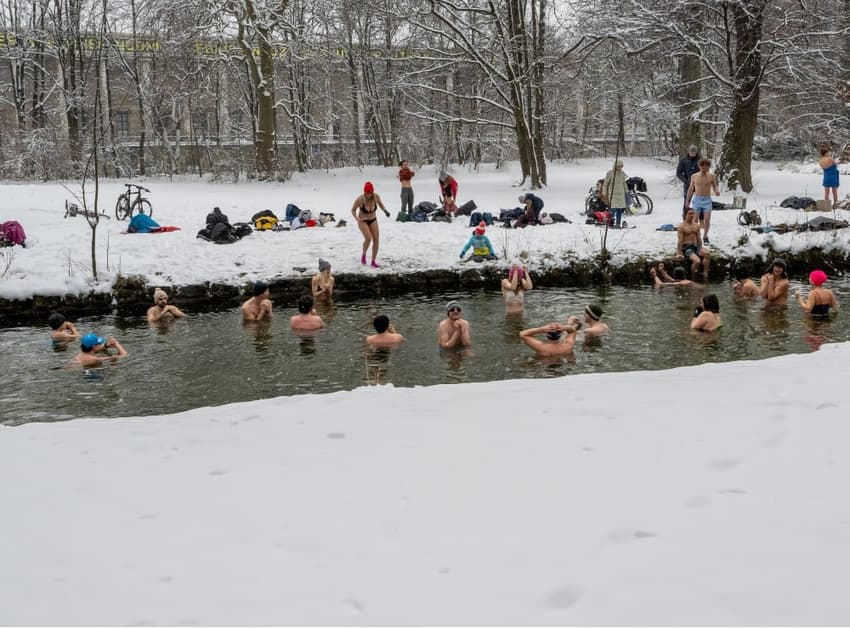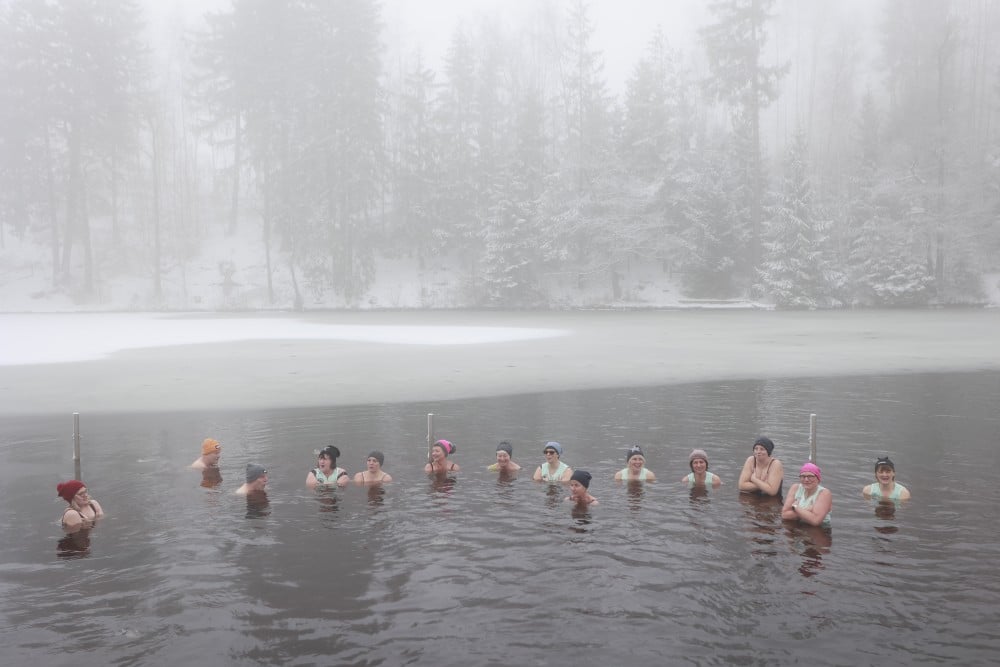Ice bathing: Is it worth it to take a (freezing) dip in Germany?

With temperatures sinking deep into the minuses this week in Germany, many people will be keeping cosy inside. But for others, it's a good chance to head to a lake.
Endorsed by an odd mix of athletes and new-age health influencers, ice bathing has gained a fair amount of attention in recent years. But while new e-commerce brands market inflatable ice plunge bath tubs to would-be bathers in warmer regions, German residents can skip the purchase and simply walk to their nearest lake anytime from the end of autumn through to the beginning of spring.
How did ice bathing originate?
The origin of ice bathing is a tricky one to pin down. There is some evidence, via ancient medical treatises, that certain cold therapies were practiced as early as 3,500 BCE in Egypt. Similarly, there were types of cold treatments used by the Ancient Greeks.
As for the modern ice plunge, which is to say submerging oneself into a body of very cold water, it appears to take off in Europe much later. In the 18th century, Scottish doctor William Cullen, prescribed cold water baths to his patients for certain ailments. Ice-bathing facilities also seem to have become popular across Nordic coastal regions around this time. Vincenz Priessnitz, a 19th century Austrian, prescribed cold baths to his fever patients as well.
Today cold baths are promoted by some athletes and alternative medicine practitioners for their apparent healing effects on the body.
Why suffer?
Advocates of cold water swimming suggest it's beneficial to cardiovascular health, and boosts insulin metabolism, pain reduction, and even mental health. But while cold bathers may anecdotally experience positive health effects, most of these claims are not confirmed by medical research.
Medicine or not, ice dippers often say that the practice elevates their mood, which is a result of the endorphins released in the brain in response to the shock that the body experiences.
In Germany, ice bathing is a popular winter pastime for those who choose to embrace the cold. Beside the act of taking a quick frigid swim itself, practitioners tend to make the habit into a social activity. In this way, ice bathing can be a cure for the winter blues – it gets one outside, among friends, and finally delivers a serotonin boost.
Where to dip in Germany
There are two bigger Berlin-based ice bathing groups. The Berliner Seehunde (Berlin Seals) have 190 members from the ages of 12 to 90, and invite new members to join them at least once a year during their "ice carnival."
The Ice Dippers invite everyone who is willing and able to join any of them public dips. They regularly organize dips for a cause – collecting donations and raising awareness about homelessness.
According to Berlin.de, ice bathing also takes place every Sunday at Tegelsee Lido, and annually on the third Sunday in January at the seaside resort of Friedrichshagen.
READ ALSO:
- Breaking the ice in Berlin: How I braved a winter dip during lockdown
- Munich swimmers take to icy waters
In Germany's third largest city, a group ironically called the Munich Hot Springs meet weekly near the Eisbach Surferwelle for frigid river dips.
 Members of the 'Eisperlen' ice bathing club go for a dip in Hasselfelde, Saxony-Anhalt. Photo: picture alliance/dpa | Matthias Bein
Members of the 'Eisperlen' ice bathing club go for a dip in Hasselfelde, Saxony-Anhalt. Photo: picture alliance/dpa | Matthias Bein
Alternatively, just grab a friend and head to your nearest lake or river that is safe for swimming.
How to safely take the plunge
There are some health risks involved with ice plunges. The most immediate is called cold shock response, which causes a rapid heart rate increase when one is immediately exposed to cold water. For this reason, it is always advised to bring a friend when going for an outdoor winter dip.
People with medical conditions should consult a doctor, and it should be avoided entirely by those who are pregnant, advice health experts.
Some bathers like to practice with cold showers or cold baths at home before trying it in a super cold, outdoor setting.
Additionally, be sure to bring a towel and warm clothes to get into immediately after the cold exposure. A warm drink also helps.
Comments
See Also
Endorsed by an odd mix of athletes and new-age health influencers, ice bathing has gained a fair amount of attention in recent years. But while new e-commerce brands market inflatable ice plunge bath tubs to would-be bathers in warmer regions, German residents can skip the purchase and simply walk to their nearest lake anytime from the end of autumn through to the beginning of spring.
How did ice bathing originate?
The origin of ice bathing is a tricky one to pin down. There is some evidence, via ancient medical treatises, that certain cold therapies were practiced as early as 3,500 BCE in Egypt. Similarly, there were types of cold treatments used by the Ancient Greeks.
As for the modern ice plunge, which is to say submerging oneself into a body of very cold water, it appears to take off in Europe much later. In the 18th century, Scottish doctor William Cullen, prescribed cold water baths to his patients for certain ailments. Ice-bathing facilities also seem to have become popular across Nordic coastal regions around this time. Vincenz Priessnitz, a 19th century Austrian, prescribed cold baths to his fever patients as well.
Today cold baths are promoted by some athletes and alternative medicine practitioners for their apparent healing effects on the body.
Why suffer?
Advocates of cold water swimming suggest it's beneficial to cardiovascular health, and boosts insulin metabolism, pain reduction, and even mental health. But while cold bathers may anecdotally experience positive health effects, most of these claims are not confirmed by medical research.
Medicine or not, ice dippers often say that the practice elevates their mood, which is a result of the endorphins released in the brain in response to the shock that the body experiences.
In Germany, ice bathing is a popular winter pastime for those who choose to embrace the cold. Beside the act of taking a quick frigid swim itself, practitioners tend to make the habit into a social activity. In this way, ice bathing can be a cure for the winter blues – it gets one outside, among friends, and finally delivers a serotonin boost.
Where to dip in Germany
There are two bigger Berlin-based ice bathing groups. The Berliner Seehunde (Berlin Seals) have 190 members from the ages of 12 to 90, and invite new members to join them at least once a year during their "ice carnival."
The Ice Dippers invite everyone who is willing and able to join any of them public dips. They regularly organize dips for a cause – collecting donations and raising awareness about homelessness.
According to Berlin.de, ice bathing also takes place every Sunday at Tegelsee Lido, and annually on the third Sunday in January at the seaside resort of Friedrichshagen.
READ ALSO:
- Breaking the ice in Berlin: How I braved a winter dip during lockdown
- Munich swimmers take to icy waters
In Germany's third largest city, a group ironically called the Munich Hot Springs meet weekly near the Eisbach Surferwelle for frigid river dips.

Alternatively, just grab a friend and head to your nearest lake or river that is safe for swimming.
How to safely take the plunge
There are some health risks involved with ice plunges. The most immediate is called cold shock response, which causes a rapid heart rate increase when one is immediately exposed to cold water. For this reason, it is always advised to bring a friend when going for an outdoor winter dip.
People with medical conditions should consult a doctor, and it should be avoided entirely by those who are pregnant, advice health experts.
Some bathers like to practice with cold showers or cold baths at home before trying it in a super cold, outdoor setting.
Additionally, be sure to bring a towel and warm clothes to get into immediately after the cold exposure. A warm drink also helps.
Join the conversation in our comments section below. Share your own views and experience and if you have a question or suggestion for our journalists then email us at [email protected].
Please keep comments civil, constructive and on topic – and make sure to read our terms of use before getting involved.
Please log in here to leave a comment.